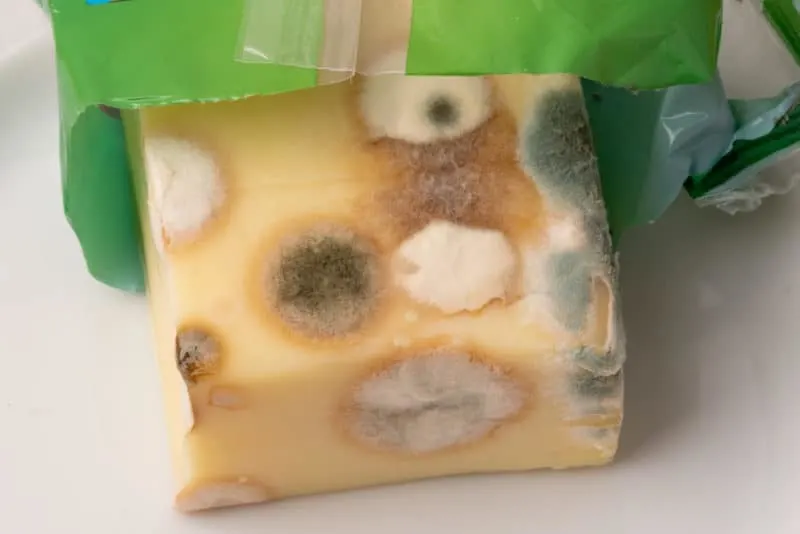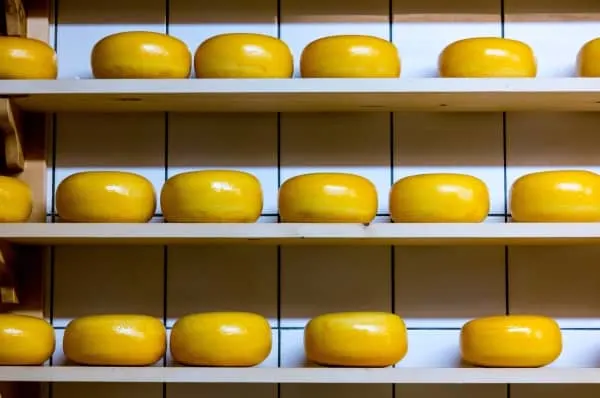Nothing compliments a spaghetti dish better than freshly grated cheese.
The issue is that those cheeses often come in big blocks. And if someone from your household is sensitive to dairy or lactose-intolerant, you probably don’t eat cheese all that often.
You buy a block, use a third or a half of it, and let the rest sit in the fridge.
And after a couple of weeks, you start to wonder: can hard cheese go bad and how long does it last?

Can Hard Cheese Go Bad? How To Tell If It Is Bad?
Just like any other dairy product, hard cheeses eventually spoil. No matter if it’s Asiago, Pecorino Romano, Gruyere, Parmesan, or one of the popular Dutch cheeses such as Gouda or Edam.
The good news is that the water content in those is quite low compared to a soft cheese like Brie, and that helps them last much longer.
We will cover the shelf life of hard cheese in a moment, but before we do that, let’s talk about how to tell if your cheese is done for.
The first and most obvious sign that there’s something wrong with this dairy product is the presence of mold that’s not natural to that kind of cheese.
You don’t need to discard hard cheese right away when mold appears. If it’s in a block form, you can cut out the moldy part and then some ([CC][OA]). When doing so, make sure the knife doesn’t touch the mold, so you don’t contaminate the rest of the block.

If there’s mold on shredded hard cheese, throw out the entire container.
When it comes to that “white stuff” that grows on some hard cheeses, it’s not mold, but cheese crystals ([WIKI]). These are normal on many varieties of long-aged hard cheese, and you can eat them ([OA]).
Over time cheese may dry out, especially if you don’t store it properly.
The dry part is perfectly edible, but not necessarily the tastiest. I recommend you either cut it off and discard, or use it for melting, where the dryness won’t be as apparent.

Other than that, the the date on the label into consideration and go with your gut.
If the cheese starts to smell sour or off in any way, throw it out. Same thing if it doesn’t look as good as it used to, or its taste deteriorated.
When it comes to the date on the package, there’s a bit of wiggle room, though.

How Long Does Hard Cheese Last?
Truth be told, there are too many varieties of hard cheese to discuss the shelf life of each one of them in this post.
And besides the multitude of types, some manufacturers age their cheese for longer than usual, which also affects how long that cheese keeps for.
Because of that, I will provide you with some general guidelines you can use no matter which hard cheese you’ve bought.
For starters, let’s talk about hard cheese in block form.
As I already mentioned, they usually last much longer than their soft counterparts. How much longer depends on the exact kind of cheese that you have.
Some of them, like Parmesan, easily last more than half a year unopened, while others like Gouda or mozzarella blocks last only maybe a month and a half.

Fortunately, there’s no need to memorize those periods, as cheese pretty much always comes with a date on the label. While it’s usually a use-by date, it doesn’t mean the cheese will spoil the day after.
In almost all cases the quality of hard cheese stays good for a few weeks more. The longer the shelf life of that particular cheese, the slower its quality degrades. That means the longer past its date it will be okay to eat.
Once you cut-open the cheese, it retains its quality for another couple of weeks. Again, the longer its shelf life, the longer it lasts after opening the package.

When it comes to shredded cheese, go with the date on the label.
Some brands use fresh cheese without any extras, while others use preservatives and special processes to make the cheese last months or even years. Either way, go with the date on the label.
Once you open the package of freshly shredded cheese, use it within a week. If it’s the long-lasting variety, you can probably keep it for months.
Last but not least, let’s cover sliced hard cheese. If you’re lazy like me, sliced Gouda or Edam is a staple in your household.
For an unopened package, go with the date on the label, plus maybe a week. Once you open it up, use its contents within a week or two tops.

Can You Freeze Hard Cheese?
If you know you won’t finish the block before its quality deteriorates, freezing is another option.
Hard cheeses freeze well and come out almost as good as fresh after thawing. Here’s how to go about it:
- Start with cutting the block into dish-sized chunks. This way, you can easily defrost only as much cheese as you need for a particular dish.
- Wrap and package the cheese. If you freeze it for a month or two tops, freezer bags should be enough. For long-term freezing wrap each chunk in plastic or freezer wrap, and then put into the freezer bag.
- Squeeze out the air and seal the freezer bags. Add a label with the name and date if you need it.
- Stick the bags into the freezer.
When it comes to defrosting, the fridge is the way to go. Transfer the hard cheese in the refrigerator the night before you need it, and it should be ready to go in the morning.

How To Store Hard Cheese?
This won’t come as a surprise, but almost all varieties of cheese need refrigeration. Okay, maybe not Velveeta cheese, but it’s not real cheese anyway.
While technically some hard cheeses can get by being stored in the pantry, their quality would drop much faster than if they sat in the fridge.
The only variety I know of that doesn’t benefit much from cold temperatures is the long-lasting shredded cheese.
It’s sold unrefrigerated, and you can easily keep it that way until you open the package. After opening, you likely need to chill it in the fridge, but check the label to make sure.
When it comes to packaging, use the original one when possible. If not, wrap the leftovers in plastic wrap, wax paper, or parchment paper, depending on what you have.
Cheese that’s not wrapped well will dry out quickly, and you don’t want that.

Summary
- If there’s mold on your block of hard cheese, cut it out with some room on all sides; the rest is okay to eat. You should discard moldy shredded or sliced hard cheese.
- Those small white spots on the surface are probably cheese crystals and are okay to eat.
- Hard cheese has a quite long shelf life, and if that’s not enough, you can easily freeze it.
- Always keep hard cheese in the fridge.
References
- [WIKI] Wikipedia: Cheese crystals
- [CC] – Cello Cheese: FAQ
- [OA] – Old Amsterdam: Frequently Asked Questions